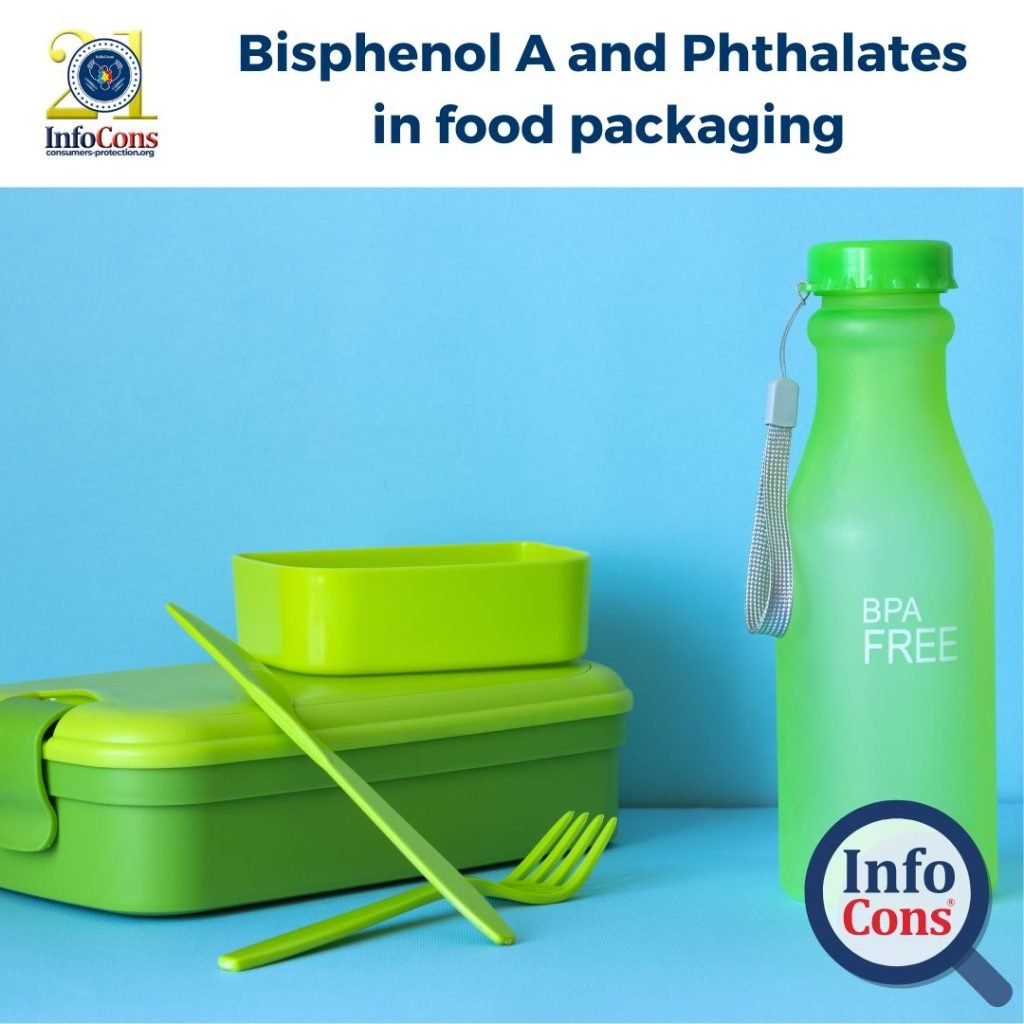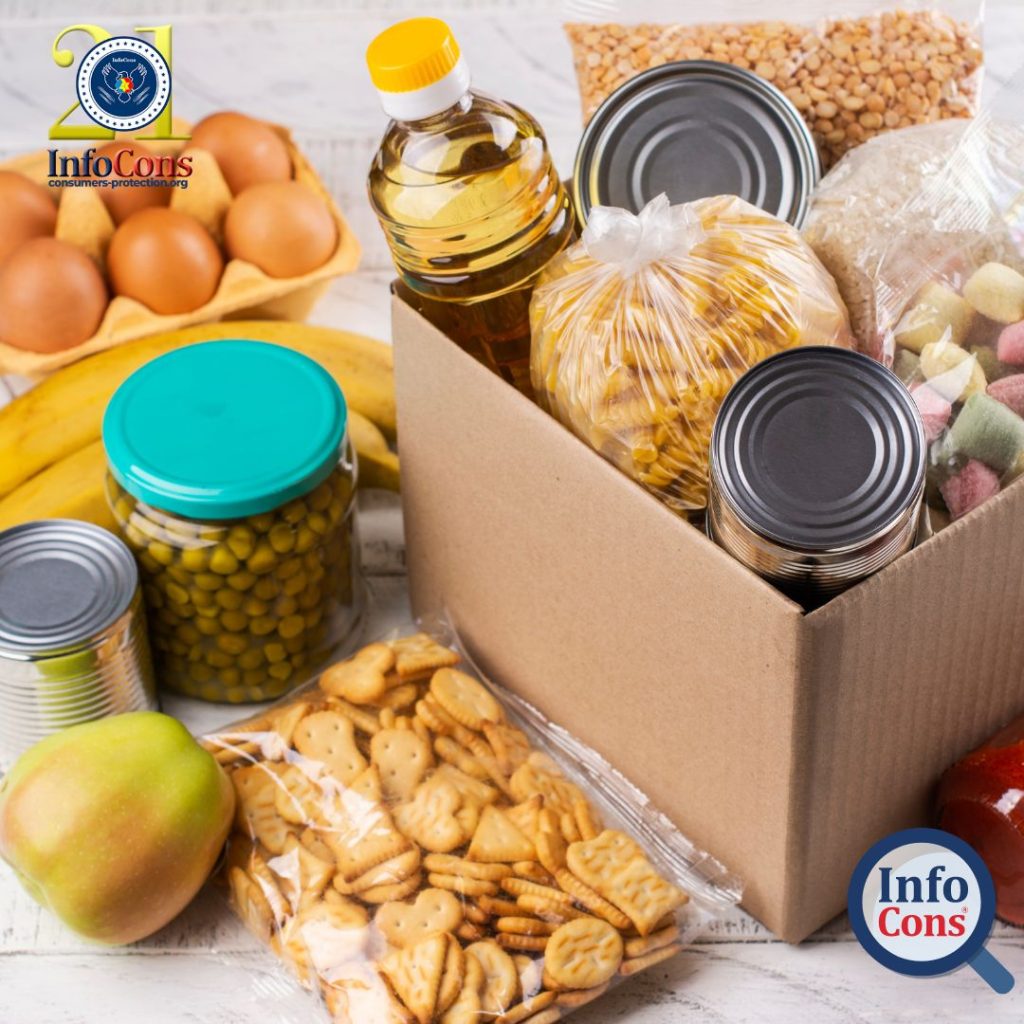
We are concerned about what we eat, reading the labels of the products we buy and often trying to make the best choices. But how careful are we about the packaging of the products we buy? Sometimes we might ignore the toxic substances that can come from the food packaging we buy, mistakenly believing they don’t end up in our bodies.
Two of the most studied chemicals are Bisphenol A (BPA) and phthalates. Phthalates are chemicals added to plastic to increase its flexibility, while BPA is also a chemical used in the production of plastic. Both have been the subject of extensive research due to their potential health impacts. These substances are found in many food packages, whether or not the products are certified organic.
Read the recommendation from InfoCons Consumer Protection – The 7 symbols of plastic and their meanings
What are Bisphenol A and Phthalates and where are they used?
Bisphenol A (BPA) is an industrial chemical primarily used in the production of polycarbonate plastics and epoxy resins. These materials are commonly found in various food containers, including water bottles, plastic containers, and the lining of cans. Phthalates are a group of chemicals used to make plastic more flexible and harder to break. They are often used in products such as food packaging, containers, and even some food processing equipment.
BPA is also used to line the inside of cans to prevent corrosion and contamination of the food inside. This extends the shelf life of canned goods and maintains product integrity. Phthalates, on the other hand, are used to soften plastics in products such as food packaging, hoses, and conveyor belts in food processing units.
Various studies by Consumer Reports, a nonprofit organization dedicated to independent product testing in the United States, have investigated bisphenols and phthalates in food and packaging several times over the past 25 years. In our new tests, a wider variety of foods were checked to see how many of these chemicals are consumed. The answer? Quite a lot. Tests conducted on nearly 100 foods found that, despite increasing evidence of potential health threats, bisphenols and phthalates remain widespread in the foods we regularly consume.
Read the recommendation from InfoCons Consumer Protection – Expert Q&A : The Impact of Ultra-Processed Foods on Health

BPA and Phthalates – The Chemicals in Plastic Hiding in Food – Health Risks
Bisphenol A can mimic estrogen and disrupt endocrine function, while phthalates can affect reproductive development and the endocrine system. These chemicals can mimic or interfere with the body’s hormones, leading to potential health problems. Research has linked BPA exposure to various health issues, including:
- Reproductive problems: BPA exposure has been associated with fertility issues and developmental problems in fetuses and infants.
- Cancer: There is evidence suggesting a potential link between BPA exposure and an increased risk of breast and prostate cancer.
- Metabolic disorders: BPA exposure may contribute to obesity and metabolic disorders like diabetes.
In the case of phthalates, the following associated problems have been identified:
- Reproductive and developmental problems: Exposure to certain phthalates has been associated with developmental issues in children, including lower IQ and developmental delays.
- Hormonal disruption: Phthalates can interfere with testosterone production and have been linked to reproductive issues in both men and women.
- Chronic diseases: There is some evidence suggesting a link between phthalate exposure and conditions such as asthma and cardiovascular diseases.
These health problems usually develop slowly, sometimes over decades, says Philip Landrigan, a pediatrician and director of the Program for Global Public Health and the Common Good at Boston College. “Unlike a plane crash, which has an immediate impact, people affected by BPA and phthalates in food packaging see effects over many years.”
Another concern is that with plastic so ubiquitous in food and other products we use regularly, these chemicals cannot be completely avoided. And, although the human body eliminates bisphenols and phthalates from our systems, constant exposure to them means they can enter our blood and tissues almost as quickly as they are eliminated. Furthermore, the harmful effects of these chemicals can be cumulative, so constant exposure even to very small amounts over time could increase associated health risks.
Pay attention to Alerts for food products with the European InfoCons App ! World Food Safety Day 2024. InfoCons Consumer Protection informs you
Regulatory Measures
Alarms are constantly being raised about the negative impact of Bisphenol A (BPA) on human health and the environment. Every day of delay in taking regulatory measures to limit people’s and the environment’s exposure to BPA and phthalates, or other chemicals in the same group, is a serious cause for concern.
It has long been known that Bisphenol A can affect fertility and disrupt the hormonal system. Due to these potential risks, regulatory bodies worldwide have taken measures to limit exposure to BPA and phthalates:
- United States: The Food and Drug Administration (FDA) has banned BPA in baby bottles and cups.
- European Union: The EU has adopted a more precautionary approach, banning BPA in baby bottles and imposing restrictions on its use in food contact materials. The EU has also imposed strict limits on the use of certain phthalates in materials that come into contact with food.
- Canada: Canada was the first country to declare BPA a toxic substance and ban its use in baby bottles. Phthalates are also regulated, with limits on their concentration in products that come into contact with food.
Did you know? Baby food contaminated with heavy metals. InfoCons Consumer Protection informs you
In February 2024, the European Commission published a proposal to ban BPA in certain materials that come into direct contact with food. This initiative will impose a ban on the use of BPA in food contact materials, including plastic packaging. This is to be published and submitted for approval to the European Food Safety Authority, which also expresses concern for human health. It is hoped that this proposal will be adopted and implemented in 2024.
The EU proposal was initiated following the reevaluation of BPA toxicity, published by the European Food Safety Authority (EFSA) in April 2023. EFSA reviewed over 800 new studies on BPA toxicity and reduced the tolerable daily dose of Bisphenol A by approximately 20,000 times. The European Court of Justice confirmed that Bisphenol A must be listed as a “substance of very high concern” for its endocrine-disrupting properties. “We know there are still many endocrine-disrupting chemicals that are not yet recognized as such by European Union legislation. It is up to the European Commission and national public authorities to initiate actions to fill these gaps. The industry must invest in alternatives rather than spending on fighting much-needed regulations.”
InfoCons Consumer Protection Informs You ! What Do Food Labels Reveal ? Why Is It Important to Read Them Carefully ?
Conclusion
Bisphenol A and phthalates have been associated with health risks that cannot be ignored. The European Union has the most comprehensive and protective chemical regulations in the world. Continued research is essential to fully understand their impact and develop safer alternatives.
In the meantime, regulatory measures and increasing consumer awareness are crucial to mitigating exposure to these potentially harmful chemicals. As science progresses, it is hoped that safer and more sustainable packaging solutions will become a priority, ensuring both the convenience and health of consumers worldwide.
Download the InfoCons application !
Look for products that have a cleaner package. Transparency in labeling helps consumers make informed choices. As a result, some consumers prefer foods labeled “bpa-free”.
Author – Cosmina Nițu
Master in Nutrition – Infant and new born nutrition
Sources:
https://www.consumerreports.org/ -Consumer Reports
https://ec.europa.eu/ – European Commission
https://www.efsa.europa.eu/en/ – European Food Safety Authority (EFSA)
InfoCons – European Organization for Consumers Protection and Promotion of Programs and Strategies , a full member of the World Organization Consumers International, founding member of the Federation of Consumer Associations, and member of ANEC.